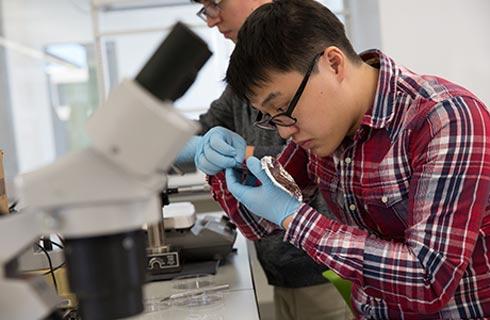- IDP China>
- 课程库>
- 工程与技术>
- 工程>
- 机械工业>
- Doctor of Philosophy in Mechanical Engineering- Solid Mechanics and Materials Science
机械工程哲学博士-固体力学与材料科学
Doctor of Philosophy in Mechanical Engineering- Solid Mechanics and Materials Science

学历文凭
Ph.D.

专业院系
Department of Mechanical Engineering

开学时间

课程时长

课程学费

国际学生入学条件
IDP—雅思考试联合主办方

雅思考试总分
6.5
- 雅思总分:6.5
- 托福网考总分:80
- 托福笔试总分:160
- 其他语言考试:DuoLingo scores - minimum score required by the Graduate School is 115.,A minimum score of 53 is required on the PTE Academic test.
CRICOS代码:
申请截止日期: 请与IDP联系 以获取详细信息。
课程简介
Solid Mechanics and Materials Science encompasses the computational, analytical, and experimental solid mechanics, the mechanical behavior of materials and materials science, and engineering. Research projects currently conducted by faculty include fatigue crack growth, nanoindentation, mechanical behavior of hard tissues and structure-property relationships; finite elements applied to fracture mechanics, micro-mechanics of composites, modeling of composites (unidirectional, laminate and woven polymer and ceramic matrix composites); mechanics of water filtration and temperature sensitive biochemical reaction, kinematics of accurate surface feature tracking in rugged 3D terrain, effect of post-fabrication surface treatment on permeability and corrosion resistance of reinforced concrete; responses and constitutive modeling of emerging materials (nano-materials, polymers and newly developed metal alloys) over wide range of strain rates and temperatures, study of anisotropic plastic responses of metals and constitutive modeling of the observed responses, grain-size reduction using severe plastic deformation (milling and ECAP) and investigations of reduced grain-size metals; modeling and design of biomedical devices, surface modification and wear of artificial joints, structurefunction relationships in aging and diseased human tissue; fracture and fatigue of biomaterials microscale specimen testing, carbon nanotube infused multi-length scale composites, and friction stir welding.
相关申请
 预科
预科 奖学金
奖学金 实习机会
实习机会 在校学习
在校学习 跨境学习
跨境学习 校园授课-线上开始
校园授课-线上开始 在线/远程学习
在线/远程学习
开学时间&学费
学费信息仅供参考,请与IDP联系以获取详细信息
| 开学时间 | 时长 | 学费 | 地点 |
|---|
学校排名

世界排名501
数据源:
泰晤士高等教育世界大学排名
关于马里兰大学巴尔的摩分校

马里兰大学-巴尔迪默分校创建于 1963 年,是一所公立综合大学。该校分为三个学院,数学与自然科学学院,工程和信息科技学院以及艺术人文和社会科学学院。马里兰大学提供本科和硕士项目,专业多达54个。 马里兰大学共有学生1万多名。师生比1:20。校园社团活动丰富,全校有250个学生组织和20个兄弟会和姐妹会。 学校占地 500 英亩,距离巴尔迪默市区15分钟车程,距华盛顿特区45分钟车程。马里兰大学的研究和科技园占地71英亩,为许多大学合作的科技、生化和实验组织提供研究基地,其中不乏美国政府研究机构。 马里兰大学在美国大学排名2012为第157名. 校园社团活动丰富,全校有250个学生组织和20个兄弟会和姐妹会。
本校相关课程

Bachelor of Science in Statistics
学历文凭
Bachelor Degree
开学日期
课程费用总额


Bachelor of Science in Mathematics
学历文凭
Bachelor Degree
开学日期
课程费用总额


应用数学哲学博士
学历文凭
Ph.D.
开学日期
课程费用总额


应用数学理学硕士
学历文凭
Masters Degree
开学日期
课程费用总额


Bachelor of Fine Arts in Visual Arts
学历文凭
Bachelor Degree
开学日期
课程费用总额


Bachelor of Arts in Visual Arts
学历文凭
Bachelor Degree
开学日期
课程费用总额

其他相关课程

机械与工业工程哲学博士
 多伦多都会大学
多伦多都会大学学历文凭
Ph.D.
开学日期
课程费用总额


Master of Science in Mechanical Engineering - Material Science
 东北大学
东北大学学历文凭
Masters Degree
开学日期
课程费用总额


Bachelor of Science in Mechanical Engineering
 利普斯科姆大学-国际学习中心(StudyGroup)
利普斯科姆大学-国际学习中心(StudyGroup)学历文凭
Bachelor Degree
开学日期
课程费用总额


机械工程学学士学位
 孟菲斯大学
孟菲斯大学泰晤士高等教育世界大学排名:1173
学历文凭
Bachelor Degree
开学日期
课程费用总额


Doctor of Philosophy in Mechanical Engineering - Fluid Power
 明尼苏达大学双城分校
明尼苏达大学双城分校学历文凭
Ph.D.
开学日期
课程费用总额


机械工程理学硕士
 罗伦斯科技大学
罗伦斯科技大学学历文凭
Masters Degree
开学日期
课程费用总额










